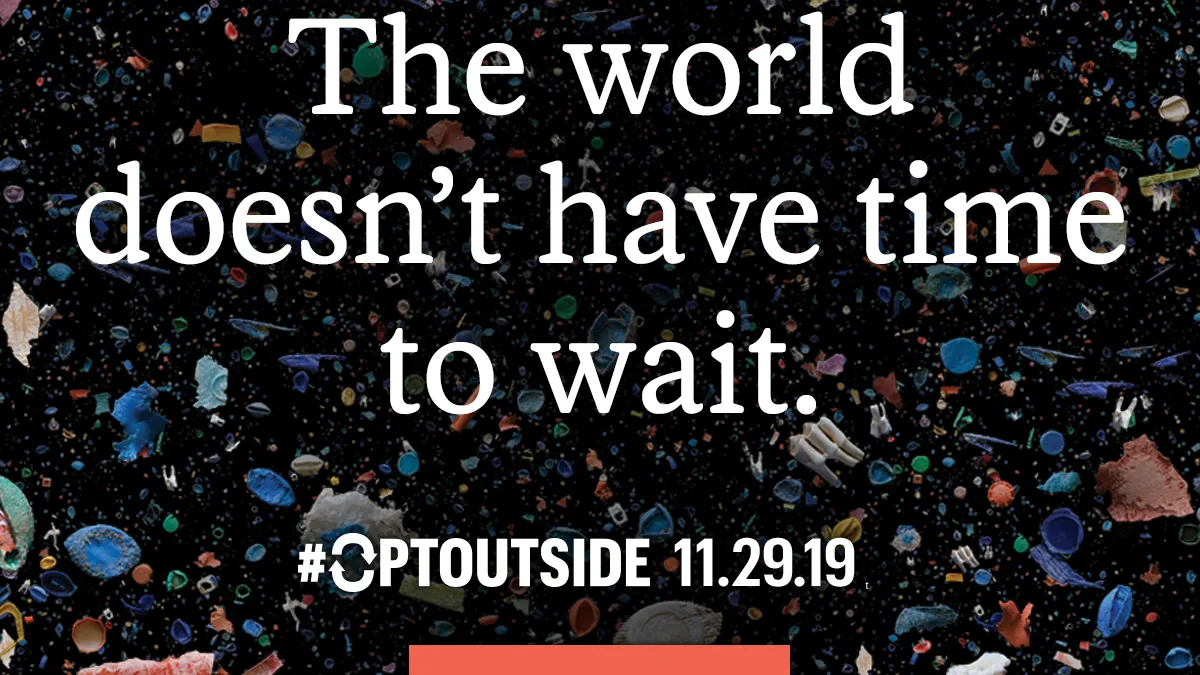The story isn't new. REI will be closing its doors again on Black Friday, paying it's 13,000 employees to spend the day outside instead, and encouraging shoppers to do so as well. In the history of the event, #OptOutside has generated 12.5 million posts on Instagram and 834,600 tweets.
But this year, the retailer is also asking a favor of it's 18 million members: to participate in a "nationwide clean-up effort" in November and sign up for a 52-week "action plan" to reduce their environmental footprint over the next year. The action plan includes everything from recycling better to thinking more critically about life choices like travel. That changes the focus of #OptOutside slightly, which has in the past centered squarely on shoppers spending time in the outdoors.
"It's our biggest megaphone," Executive Vice President and Chief Customer Officer Ben Steele said of Black Friday. "We as an organization and as a brand have, over the course of the last four years and going into this fifth year, gotten the attention of the industry, gotten the attention of the consumer, gotten the attention of our membership, by being willing to do something different on that day and something hard for a lot of businesses."
Now, REI wants to use that platform to encourage consumers to "opt to act." Activist marketing is nothing new to consumers — if anything, there's too much of it for their taste lately. But there's also a difference between an environmentally friendly brand championing the environment, and everyone else jumping on board because it's the latest industry buzzword, which can come with major repercussions.
In this case, REI is dedicated to walking the walk, as well as talking the talk. While the retailer has always been interested in protecting outdoor spaces, CEO Eric Artz came in with a "desire for REI to go all-in on this issue," according to Steele, both through its own actions and customer-facing campaigns like #OptOutside.
The retailer highlighted several of its own initiatives around the event this year, including a reusable bag exchange coming to stores, its efforts in the used gear and rental space, and plans to reach zero-waste operating status by the end of 2020.
In terms of rental, which REI has steadily expanded over the past year, Steele said the company will be trialing an online reservation system that will let co-op members place a hold on gear in advance of big trips. The company is also planning to test out a used gear buyback with 5,000 of its members. (Its garage sales are already incredibly popular, and responses to newer offerings have been "just as enthusiastic," Steele said).
"It's taking trends and offerings that absolutely we can see in the marketplace around us and then saying, 'How do we make that easier for our members?'" Steele said.
He noted that making consumers more conscious of how their choices impact the environment is partly a brand responsibility, which is another reason REI is taking a bigger step into the social action space this time around. Over the course of November, REI will have 11 cleanup sites in partnership with Leave No Trace and United by Blue that customers can participate in.
Outside of Black Friday, the retailer's 52-week program is aimed at encouraging small changes throughout the year, to help with the fact that some consumers feel "frozen" when it comes to taking action, uncertain of what they can do to help.
"I think what we're asking people to do is the thing we've always asked them to do: Go outside to a place you love with people that you love and if you see an opportunity while you're out there to make that place a little better, do it," Steele said, adding that he hopes participation will be just as strong despite the added responsibility.
In addition to asking customers to do their part protecting the environment — something brands like Patagonia have also tried — REI's latest #OptOutside campaign raises the question of how much businesses should be involved in making retail more sustainable. To Steele, it varies from retailer to retailer, but REI is actively talking about ways to give shoppers more choices, and inform them of the environmental impact of those choices (such as using BOPIS versus home delivery).
"It's not enough to be a leader if the reality is the situation is worsening," Steele said. "If we're facing a climate crisis, I'm proud of the work that we've done, and incredibly proud of the people who made those choices in the decades that precede us, but we've got to be willing to say: 'What's the outcome we're all trying to get to and what are we willing to do to get there?' I encourage businesses to think not just about a profit, or not just about the ability to do more or do faster when you think about something like delivery, but to ask the question: 'What is the impact of all that we do?'"
















